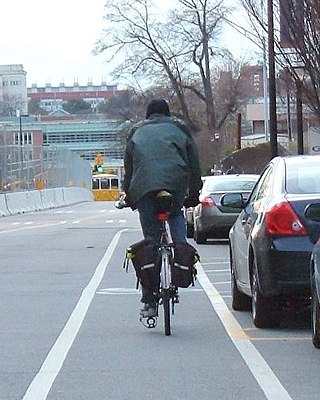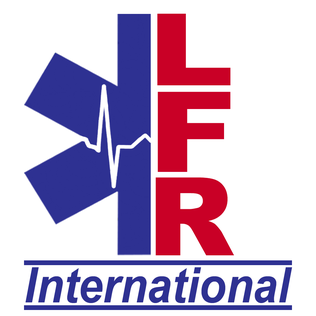Related Research Articles

Automotive safety is the study and practice of automotive design, construction, equipment and regulation to minimize the occurrence and consequences of traffic collisions involving motor vehicles. Road traffic safety more broadly includes roadway design.

Road traffic safety refers to the methods and measures used to prevent road users from being killed or seriously injured. Typical road users include pedestrians, cyclists, motorists, vehicle passengers, horse riders, and passengers of on-road public transport.

Dooring is the act of opening a motor vehicle door into the path of another road user. Dooring can happen when a driver has parked or stopped to exit their vehicle, or when passengers egress from cars, taxis and rideshares into the path of a cyclist in an adjacent travel lane. The width of the door zone in which this can happen varies, depending upon the model of car one is passing. The zone can be almost zero for a vehicle with sliding or gull-wing doors or much larger for a truck. In many cities across the globe, doorings are among the most common and injurious bike-vehicle incidents. Any passing vehicle may also strike and damage a negligently opened or left open door, or injure or kill the exiting motorist or passenger.
Make Roads Safe is a global road safety campaign established with the aim of securing political commitment for road traffic injury prevention around the world.

ReliefWeb (RW) is a humanitarian information portal founded in 1996. As of July 2023, it hosts more than one million humanitarian situation reports, press releases, evaluations, guidelines, assessments, maps and infographics. The portal is an independent vehicle of information, designed specifically to assist the international humanitarian community in effective delivery of emergency assistance or relief. It provides information as humanitarian crises unfold, while emphasizing the coverage of "forgotten emergencies" at the same time.
European Road Assessment Programme (EuroRAP) is an international nonprofit (vzw) organisation registered in Belgium. It operates from Worting House, Basingstoke, Hampshire.
The Association for Safe International Road Travel is a non-profit, humanitarian organization that promotes road travel safety through education and advocacy. Rochelle Sobel, president and founder of ASIRT, created the organization in 1995, in response to her son Aron's death in a bus crash in Turkey. ASIRT helped found the US Congressional Caucus on Global Road Safety, and is an internationally influential and active organization. Working under the premise that road crashes are predictable and preventable, ASIRT serves the global community in a variety of ways to help reduce injuries and deaths and the associated social and economic impacts that result from them.

A collision avoidance system (CAS), also known as a pre-crash system, forward collision warning system (FCW), or collision mitigation system, is an advanced driver-assistance system designed to prevent or reduce the severity of a collision. In its basic form, a forward collision warning system monitors a vehicle's speed, the speed of the vehicle in front of it, and the distance between the vehicles, so that it can provide a warning to the driver if the vehicles get too close, potentially helping to avoid a crash. Various technologies and sensors that are used include radar (all-weather) and sometimes laser (LIDAR) and cameras to detect an imminent crash. GPS sensors can detect fixed dangers such as approaching stop signs through a location database. Pedestrian detection can also be a feature of these types of systems.

A traffic collision, also called a motor vehicle collision, occurs when a vehicle collides with another vehicle, pedestrian, animal, road debris, or other moving or stationary obstruction, such as a tree, pole or building. Traffic collisions often result in injury, disability, death, and property damage as well as financial costs to both society and the individuals involved. Road transport is the most dangerous situation people deal with on a daily basis, but casualty figures from such incidents attract less media attention than other, less frequent types of tragedy. The commonly used term car accident is increasingly falling out of favor with many government departments and organizations, with the Associated Press style guide recommending caution before using the term. Some collisions are intentional vehicle-ramming attacks, staged crashes, vehicular homicide or vehicular suicide.

Joanna Shields, Baroness Shields, is a British-American businesswoman and politician. Shields was made a Life Peer in the House of Lords in 2014, and later served as Minister for Internet Safety and Security under David Cameron and Theresa May. She had also served as Advisor on the Digital Economy to David Cameron.

SaveLIFE Foundation (SLF) is an independent, non-profit, non-governmental organization focused on improving road safety and emergency medical care across India. SLF combines evidence-based research with policy advocacy, communication, and on-ground execution of projects in the two areas of crash prevention as well as post-crash response. Over the past few years, SLF has facilitated the enactment of the Good Samaritan Law in India, which insulates lay rescuers of injured victims from ensuing legal and procedural hassles. It has also adopted the Mumbai Pune Expressway to transform it into a Zero Fatality Corridor, trained several thousand Police personnel and citizens in basic life-saving techniques, and built technology platforms to assist road users and those interested in road safety.

Traffic collisions in India are a major source of deaths, injuries and property damage every year. The National Crime Records Bureau (NCRB) 2021 report states that there were 155,622 fatalities, highest since 2014, out of which 69,240 deaths were due to two-wheelers. A study by Insurance Institute for Highway Safety, U.S. shows that the use of seat belts significantly reduces the risks and injuries from road accidents, and yet there is no enforcement on use of seat belts in cars. A study by IIT Delhi points out that the national highways constitute only 2% of the length of roads in India, but they account for 30.3% of total road accidents and 36% of deaths.

A New Car Assessment Program is a government car safety program tasked with evaluating new automobile designs for performance against various safety threats.
The Accord on Fire and Building Safety in Bangladesh was signed on 15 May 2013. It is a five-year independent, legally binding Global Framework Agreement between global brands, retailers, and trade unions designed to build a safe and healthy Bangladeshi Ready Made Garment (RMG) Industry. The agreement was created in the immediate aftermath of the Rana Plaza building collapse in Bangladesh that resulted to the death of more than 1100 people and injured more than 2000. In June 2013, an implementation plan was agreed leading to the incorporation of the Bangladesh Accord Foundation in the Netherlands in October 2013.

SHARP is a British government quality ratings scheme for motorcycle helmets, established in 2007, with the objective of improving motorcycle safety on UK roads.
Kunhadi is a non-profit organization concerned with road safety in Lebanon. Kunhadi is aimed at raising road safety awareness, especially among young people. The organization was established in 2006 after Hady Gebrane died from a car crash at age 18.

Janet Woodcock is an American physician serving as Principal Deputy Commissioner of Food and Drugs, having previously served as Acting Commissioner of the U.S. Food and Drug Administration (FDA). She joined the FDA in 1986, and has held a number of senior leadership positions there, including terms as the Director of Center for Drug Evaluation and Research (CDER) from 1994 to 2004 and 2007 to 2021.
Carol Fowler Durham is an American Clinical Professor of Nursing and Doctor of Education who is known as a leader in the fields of Healthcare Quality and Safety, nursing education, interprofessional education, and medical simulation.
The Global Alliance of NGOs for Road Safety is a collection of nongovernmental organizations (NGOs) that implement programs and lobby for road safety initiatives around the world. As an umbrella organization, it currently represents more than 200 member NGOs from 90-plus countries.

LFR International is an American international nonprofit organization focused on prehospital emergency medical research and emergency medical services development in sub-Saharan Africa. LFR launches sustainable prehospital emergency care programs in resource-limited settings of low-income countries without formal emergency medical services by collaborating with local governments and stakeholders to train lay first responders.
References
- ↑ "Road Safety Awards: About us". www.roadsafetyawards.com. Retrieved 22 June 2019.
- ↑ "Prince Michael International Road Safety Awards". Global Alliance of NGOs for Road Safety. 13 December 2017. Retrieved 22 June 2019.
- ↑ "Royal award for Northumbria Police road safety team". ITV News. 15 December 2016. Retrieved 22 June 2019.
- ↑ Road Safety Awards (6 November 2017), 30 Years Prince Michael Awards , retrieved 22 June 2019
- ↑ "LTA wins Prince Michael International Road Safety Award". The Online Citizen. 15 December 2016. Retrieved 22 June 2019.
- ↑ "SA NGO receives top international road safety award in London". The South African. 17 December 2012. Retrieved 22 June 2019.
- ↑ Arminas, David (January 2019). "International Road Safety Awards: the winners". ITS International. Retrieved 22 June 2019.
- ↑ @ntvuganda (12 December 2017). "Register" (Tweet). Retrieved 10 January 2022– via Twitter.